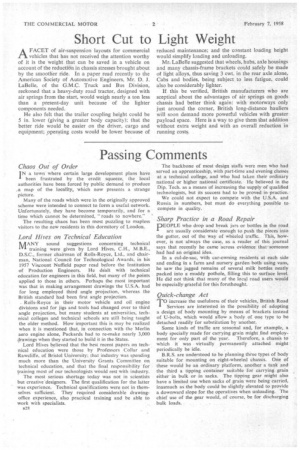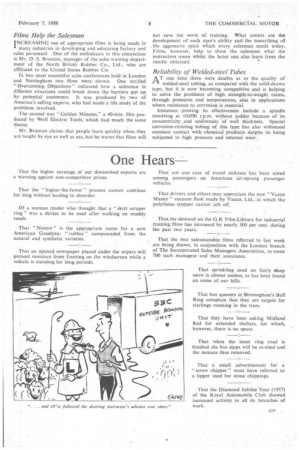Passing Comments
Page 38

Page 39

If you've noticed an error in this article please click here to report it so we can fix it.
Chaos Out of Order
IN a town where certain large development plans have I been frustrated by the credit squeeze, the local authorities have been forced by public demand to produce map of the locality, which now presents a strange picture.
Many of the roads which were in the originally approved scheme were intended to connect to form a useful network. Unfortunately, they have become temporarily, and for a time which cannot be determined, "roads to nowhere."
The resulting chaos has been most puzzling to mapless visitors to the new residents in this dormitory of London.
Lord Hives on Technical Education
MANY sound suggestions concerning technical training were given by Lord Hives, CH_, MBE., D.S.C., former chairman of Rolls-Royce, Ltd., and chairman, National Council for Technological Awards, in his 1957 Viscount Nuffield paper read before the Institution of Production Engineers. He dealt with technical education for engineers in this field, but many of the points applied to those in others. Perhaps the most important was that in making arrangement drawings the U.S.A. had for long employed third angle projection, whereas the British standard had been first angle projection.
Rolls-Royce in their motor vehicle and oil engine divisions and for jigs and tools had changed over to third angle projection, but many students at universities, technical colleges and technical schools are still being taught the older method. How important this is may be realized when it is mentioned that, in connectioh with the Merlin aero engine alone, Paekards had to re-make nearly 3,000 drawings when they started to build it in the States.
Lord Hives believed that the best recent papers on technical education were those by Professors Collar .and Rawcliffe, of Bristol University; that industry was spending much more than the University Grants Committee on technical education, and that the final responsibility for 1.raining most of our technologists would rest with industry.
The most serious shortage today was not in scientists but creative designers. The first qualification for the latter was experience. Technical qualifications were not in themselves sufficient. They required considerable drawingoffice experience, also practical training and be able to work with specialists.
a28
The backbone of most -design staffs were men who had served an apprenticeship, with part-time and evening classes at .a technical college, and who had taken their ordinary national or higher national certificate. He believed in the Dip. Tech. as a means of increasing the supply of qualified technologists, but its success had to be proved in -practice.
We could not expect to compete with the U.S.A. and Russia in numbers, but must do everything possible to compete in quality.
Sharp Practice in a Road Repair
PEOPLE who drop and break jars or bottles in the road are usually considerate enough to push the pieces into the gutter, out of the way of wheeled traffic. This, however, is not always the case, as a reader of this journal says that recently he came across evidence that 'someone had had an original idea.
In a cul-de-sac, with car-owning residents at each side and ending in a farm and nursery garden both using vans, he saw the jagged remains of several milk bottles neatly packed into a muddy pothole, filling this to surface level. He did not think that many of the local road users would be especially grateful for this forethought.
Quick-change Act TO increase the usefulness of their vehicles, British Road Services are interested in the possibility of adopting a design of body mounting .by means of brackets instead of U-bolts, which would allow a body of one type to be detached readily for substitution by another.
Some kinds of traffic are seasonal and, for example, a body specially made for carrying grain might find employment for only part of the year. Therefore, a chassis to which it was virtually permanently attached might periodically be idle.
B.R.S. are understood to be planning three types of body suitable for mounting on eight-wheeled chassis. One of these would be an .ordinary platform, another a tank and the third a tipping container suitable for carrying grain either in bulk or in sacks. The tipping gear might also have a limited use when sacks of grain were being carried, inasmuch as the body could be slightly elevated to provide a downward slope for the operatives when unloading. The chief use of the, gear would, of course, be for discharging
bulk loads. .
Films Help the Salesman
INCREASING use of appropriate films is being made in many industries in developing and educating factory and sales personnel. One of the enthusiasts in this connection is Mr. D. S. Brunton, manager of the sales training department of the North British Rubber Co., Ltd., who are affiliated to the United States Rubber Co.
In two most successful sales conferences held in London and Nottingham two films were shown. One entitled "Overcoming Objections" indicated how a salesman in different situations could break down the barriers put up by potential customers. It was produced by two of America's selling experts, who had made a life study of the problems involved.
The second was "Golden Minutes," a 40-min. film produced by Wolf Electric Tools, which had much the same theme.
Mr. Brunton claims that people learn quickly when they are taught by eye as well as ear,-but he warns that films will not save the work of training. What counts are the development of each man's ability and the unearthing of . the aggressive spirit which every salesman needs today. Films, however, help to show the salesmen what the instructors mean whilst the latter can also learn from the results obtained.
Reliability of Welded-steel Tubes
AT one time there were doubts as to the quality of welded-steel tubing, as compared with the solid-drawn type, but it is now becoming competitive and is helping to solve the problems of high strength-to-weight ratios, through pressures and temperatures, also in applications where resistance to corrosion is essential.
Instances proving its effectiveness include a spindle revolving at 10,000 r.p.m. without judder because of its concentricity _and uniformity 'of wall thickness. Special corrosion-resisting tubing of this type has also withstood constant contact with 'chemical products despite its being subjected to high pressure and internal wear.
































































































































